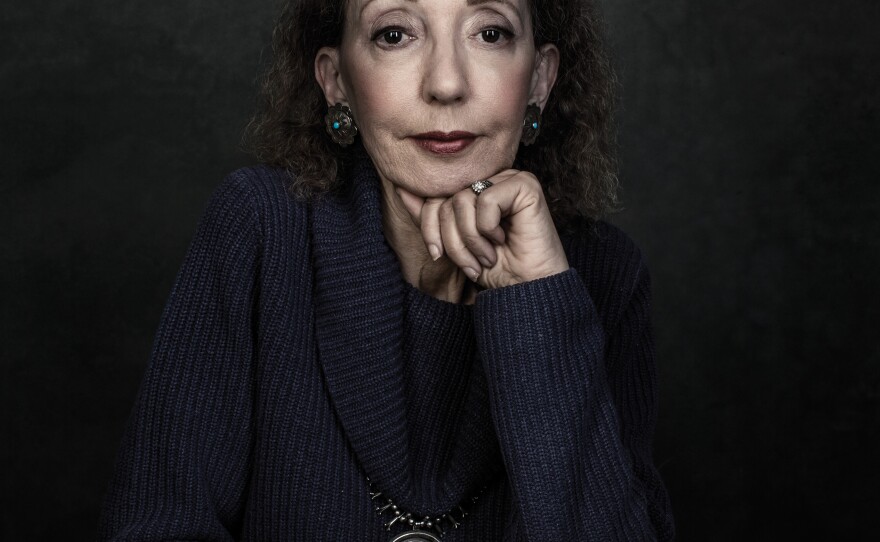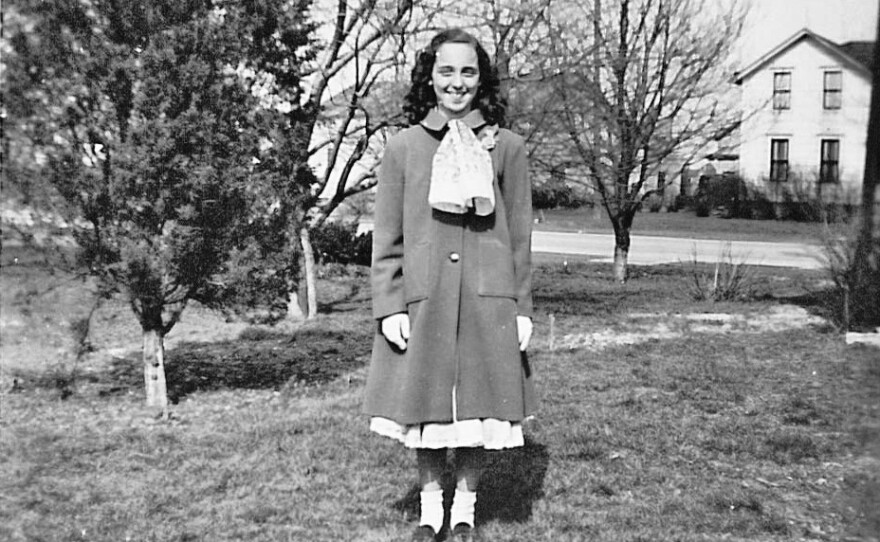Joyce Carol Oates is famous not only for the quality of her writing but also for the quantity. She has written more than 50 novels as well as a very long list of non-fiction, poetry, plays and short stories. Violence haunts her work and, working with a diverse array of subjects, she always offers a probing look at the dark side of human nature. In her new memoir The Lost Landscape, Oates explores how her early years shaped her as a person and a writer.
The photo on the cover of the memoir shows a little girl around 8 or 9. Her hands are clasped in front of her and her eyes are turned towards someone or something off to the side. She has a sweet, shy smile and look on her face that is the very definition of the word bashful. This is Joyce Carol Oates as a child on the farm in upstate New York where she grew up.
These days Oates lives in a big house in Princeton, N.J., which is filled with quilts her mother made, her father's childhood violin, family photos, and other mementos from her childhood.
Digging into a box of old photographs, she pulls out one of her paternal grandmother. "She was tremendously influential," Oates says. "I think of her, probably almost every hour."
The photo shows her grandmother as a stylishly dressed young woman in 1915. Her husband left her and she raised her young son alone. She was Jewish but hid that fact from everyone. She lived in town and introduced her young granddaughter to the local library. She gave Oates her first typewriter and perhaps most importantly her Alice in Wonderland — the book that she says made her a writer.
"This is my first book and just loved it," Oates says. "I basically memorized it. I just read this book over and over again. ... I did have other books but this is the one the really, really stimulated my imagination."

Oates' home is surrounded by several acres of land. It's not exactly a farm, but it gives her the kind of outdoor space she says she needs to wander in and think.
As a kid Oates remembers roaming the countryside, peeking into abandoned houses and imagining what life was like for the families that had once lived there.
"I spent a lot of time alone and I think to be a reader and a serious writer you have to spend time alone," she says. "I like to work alone, to walk around, to be out in the orchard. I had my special places where I walked along the Tonawanda Creek. I had my bicycle. I spent a lot time thinking, and daydreaming and making up little stories, just kind of imagining things."
Her father, Oates says, was a factory worker who was a self-taught man. He loved to play the piano and even learned to fly. Her mother was warm and affectionate, busy with work on the farm. There was always something to do, says Oates, and the work habits she formed on the farm go a long way to explaining how prolific she is as a writer.
"I think probably it was an unusual upbringing because we did work all the time and if I have nothing to do I am very unhappy," Oates says. "I think on a farm basically one is always working. I am not sure that work is always the right word because you are always so absorbed in what you are doing."
But it wasn't all idyllic; there were some dark family secrets. Her maternal grandfather was murdered in a local tavern. After his death her mother was given away to be raised by the relatives who owned the farm where Oates grew up. Her father's father abandoned his family. And in the countryside and nearby towns, life was tough for many of her neighbors and friends.
"I've sometimes been criticized for the violence in my writing but it was really not that unusual in my background," she says. "I wasn't imagining or inventing any of these things."

Her memoir is a study in contrasts, moving from scenes of a happy childhood to stories tinged with tragedy or violence. In one of those abandoned houses she used to pass by, an abusive father tormented a neighboring family. The one-room school she attended looked like something from a Norman Rockwell painting and Oates was a natural student who loved to learn. But the older farm boys who went to the school only because they had to terrorized their young classmates.
It was more than just average bullying. There was "sexual molestation and harassment of every kind — bullying of any kind, boys and girls," Oates recalls. "But it was so saturated in that way of life that there was no expectation of anything different. So I did grow up in a very rough environment. It didn't break me or wound me. I basically just accepted it – and maybe it did form some of my sense of human nature."
Domestic violence, rape, suicide — these are themes Oates returns to again and again in her work. In the working class world of upstate New York she says this was as much a part of the landscape as apple orchards. When she was a kid she didn't think much about the violence that occurred on the edges of her world. That changed as she grew up.
"I think when I was older and beginning to write I naturally looked back on my childhood for material because people tend to write about their own childhoods," she says. "So then I could see some of these outlines, some of these themes which was very much part of my experience."
Oates says it was her parents' love that protected her from the world outside their home. But she is drawn to writing about people who had to get through life without that protection.
"I once wrote a long novel about Norma Jean Baker who becomes Marilyn Monroe," she says. "And the great tragedy of Norma Jean Baker's life is that her mother basically didn't love her and she didn't have a father. He never acknowledged her even after she was quite famous. So it wouldn't really matter how famous she became, and how successful, and how beautiful, because she didn't really have that early love and protection. And I think because I had that, I sort of carry that with me, even today."
There is a part of Oates that still yearns for that "lost landscape" of her youth and for the energetic, loving parents who raised her. But she knows she is lucky to have moved on from there and to have the luxury of looking back on it from a distance, with the eye and the imagination of a writer.
Copyright 2023 NPR. To see more, visit https://www.npr.org. 9(MDAzMjM2NDYzMDEyMzc1Njk5NjAxNzY3OQ001))








